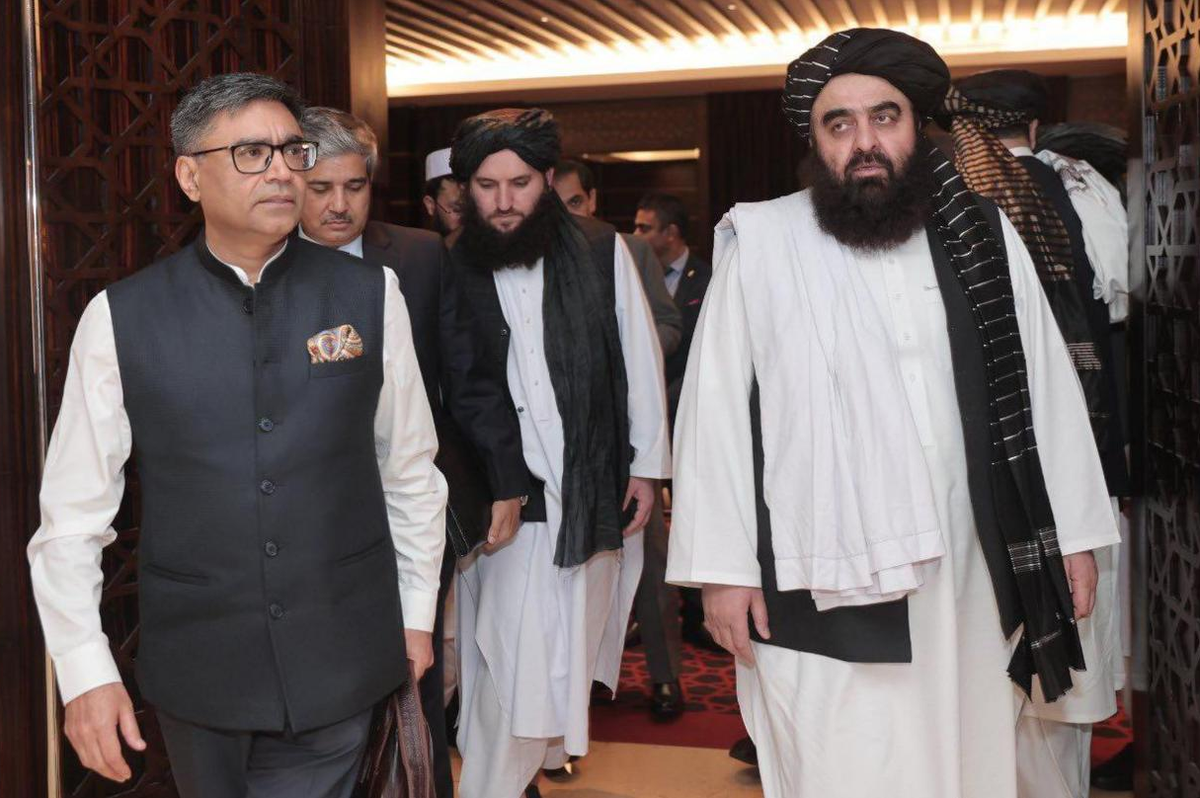India hosts Taliban envoy as Kabul rebalances its foreign policy
Amir Khan Muttaqi's October 9-16 visit, the first since 2021, highlights Kabul’s shift toward India and Pakistan’s waning influence

Asma Kundi
Producer, Islamabad
Asma Kundi is a multimedia broadcast journalist with an experience of almost 15 years. Served national and international media industry as reporter, producer and news editor.

In this file photo, India’s Foreign Secretary Vikram Misri met Afghan FM Amir Khan Muttaqi in Dubai in January 2025.
MEAIndia/X
When Afghanistan’s Taliban foreign minister Amir Khan Muttaqi lands in New Delhi next week, it will mark more than a rare diplomatic journey.
His October 9-16 visit, the first by a Taliban cabinet member to India since the group’s 2021 takeover, underscores how Kabul’s foreign policy is shifting - and how Pakistan, once its closest patron, is struggling to hold sway.
The trip, authorized under a United Nations Security Council travel ban exemption on September 30, represents a breakthrough for India’s outreach to the Taliban, who until recently were largely isolated on the international stage.
For Islamabad, the optics are starker, serving as a reminder that its leverage in Kabul is steadily diminishing at a moment of rising border tensions and resurgent militancy.
India steps in as relations fray
India has spent the past four years positioning itself as a reliable partner through humanitarian aid, medical assistance and rapid disaster relief - steps that built a bridge for higher-level diplomacy. Recent meetings in Dubai and a follow-up call between Indian External Affairs Minister S. Jaishankar and Muttaqi laid the foundation for the October visit, where discussions are expected to cover trade, security, and counterterrorism.
“India is filling the vacuum created by mistrust between Pakistan and the Taliban,” said Dr. Qamar Cheema, Executive Director of the Sanober Institute.
“Kabul sees diversification as the safer bet, and New Delhi is eager to oblige.”
Pakistan’s strategic setback
For Pakistan, the diplomatic optics are troubling. Since 2023, relations with Kabul have soured over cross-border militancy, with Islamabad accusing the Taliban of allowing the proscribed Tehreek-e-Taliban Pakistan (TTP) to stage attacks from Afghan soil. The tensions deepened this year when Pakistan accelerated its “illegal foreigners repatriation plan,” expelling over 80,000 Afghan refugees.
“Pakistan should have been the natural first stop for Muttaqi, not India,” noted former Pakistani Ambassador to Kabul Mansoor Ahmed Khan. “The fact that he is traveling to New Delhi before Islamabad shows how far the gap has widened.”
Khan urged both governments to prioritize confidence-building measures on trade, people-to-people ties, and counterterrorism.
“If these steps are delayed, the distance will only grow and rivals, particularly India, will exploit the situation along our western border,” he warned.
Geopolitics in motion
The visit also reflects broader regional shifts. Earlier this year, China helped broker limited progress between Islamabad and Kabul, securing agreements on ambassador exchanges and CPEC-related cooperation. But Pakistan’s recent tilt toward Washington - driven by U.S. pressure on the Taliban over counterterrorism and American interest in regaining access to Bagram Airbase - has deepened Taliban mistrust of Islamabad as being too closely aligned with Western interests.
Meanwhile, U.S.-Taliban frictions over sanctions and human rights have left room for India to strengthen its own diplomatic channels.
The Taliban’s participation in the recent Moscow Format talks further signaled Kabul’s determination to expand partnerships beyond its traditional neighborhood.
Kabul’s calculations
For the Taliban, balancing relationships remains key. India’s offer of the Chabahar Port as a trade corridor - though constrained by U.S. sanctions - adds to Kabul’s options.
“The Taliban want to show they are not dependent on Pakistan,” Cheema said. “By opening doors to India and the Arab states, they are signaling independence while keeping Islamabad at arm’s length.”
Still, this comes at a cost. Pakistan has been pressing for greater Taliban cooperation on counterterrorism through institutional mechanisms with China and Iran. But Kabul’s reluctance to act against the TTP continues to erode trust.
Islamabad at a crossroads
As Muttaqi heads to New Delhi, Islamabad faces a sobering reality: its once-dominant position in Afghan affairs is slipping.
With China’s mediation losing traction, U.S. involvement reshaping Kabul’s calculus and India stepping in with fresh momentum, Pakistan must recalibrate its strategy or risk being sidelined in a region where it long considered itself indispensable.










Comments
See what people are discussing